The Epson Home Cinema 1080 is a 1080p LCD projector. It can project a 30-inch image at a distance of about 2.2 feet and up to a gigantic 300-inch image at a distance of approximately 22 feet. It has auto vertical keystone and manual horizontal keystone technology to help fix any geometry errors resulting from its installation, and it has a 1.2x optical zoom to adjust the projection's size without physically moving the unit. The projector has Epson's 3LCD technology, allowing it to project bright 1080p images. The projector has two HDMI 2.0 ports for full 1080p @ 60Hz gaming and has integrated Wi-Fi 5 with Miracast support for screen mirroring.
Our Verdict
The Epson Home Cinema 1080 projector is decent for watching movies. It's very bright and performs quite well in moderately lit rooms. Unfortunately, its contrast is weak, and its blacks are visibly raised; thus, this projector is at its best in dim, rather than pitch black rooms, where its poor contrast is more obvious. While it doesn't have a wide color gamut, its colors in SDR look good due to the projector's brightness. You can't improve the unit's image accuracy much with calibration, but it won't matter for all but the most hardcore color enthusiasts due to how great it already is.
- Very bright projector that can handle a few lights with ease.
- Great color accuracy out of the box.
- Has Wi-Fi 5 with Miracast support for easy screen mirroring.
- Lacks a smart OS.
Weak contrast particularly struggles in near-dark content when compared to many projectors.
The Epson Home Cinema 1080 projector isn't aimed at gamers. It's a 1080p @ 60Hz projector with noticeable input delay, so it feels fine for slow turn-based single-player titles but not ideal for anything else. There's no 120Hz path, and Game Mode doesn't reduce latency. As for image quality, it is an exceedingly bright projector, capable of handling a few lights with ease. Unfortunately, it has weak contrast, and it doesn't have a wide color gamut, so it doesn't offer an especially attractive gaming experience.
- Very bright projector that can handle a few lights with ease.
- Great color accuracy out of the box.
Weak contrast particularly struggles in near-dark content when compared to many projectors.
Limited to 1080p @ 60Hz.
Very high input lag, and Game Mode doesn't reduce it.
The Epson Home Cinema 1080 is exceedingly bright. Even though, like any projector, it still looks best in dim rooms, it's bright enough to handle moderately lit rooms. It also has excellent brightness uniformity, although there is some vignetting.
- Very bright projector that can handle a few lights with ease.
Some visible vignetting.
The Epson Home Cinema 1080's contrast is weak. It's especially poor in near-dark scenes compared to other projectors. It does perform better in brighter scenes, but it's still only mediocre there. Ultimately, this isn't the projector for you if you want deep blacks.
Weak contrast particularly struggles in near-dark content when compared to many projectors.
Changelog
-
Updated Jan 30, 2026:
We've modified the text in our Brightness and Native Contrast text boxes as a result of our latest test bench. We've also added Brightness and Contrast performance usages in the Verdict section.
- Updated Jan 21, 2026: We've converted the review to Test Bench 0.11, which renames our Contrast test to Native Contrast, and adds a Sequential Contrast test box. We also added new Brightness and Contrast performance usages in Our Verdict. See the 0.11 changelog.
-
Updated Oct 22, 2025:
We've added Imaging, Optics, Noise, Supported Resolutions, HDR Format Support, 3D, Input Lag, and Audio Passthrough boxes as a result of our latest test bench. We've also added a Gaming usage in the Verdict section.
- Updated Oct 14, 2025: We've converted the review to Test Bench 0.10, which updates our Design tests, and adds a whole new suite of Inputs tests. We also added new gaming-oriented usage scores in Our Verdict. See the 0.10 changelog.
Check Price
Differences Between Sizes And Variants
The Epson Home Cinema 1080 is an entry-level model in Epson's mid-range 3LCD home theater line. Unlike the more expensive 3LCD models, the 1080 lacks HDR support and pixel shifting capabilities. In Epson's lineup, it sits below the Epson Home Cinema 2350 (which has pixel shifting, HDR support, and comes with an Android TV dongle), the Epson Home Cinema 3800 (brighter with more advanced processing), and the premium Epson Home Cinema 5050UB (with motorized optics, superior contrast, and enhanced color performance). Here's how they stack up:
| Model | Native Resolution | Pixel-Shift (4K PRO-UHD) | Brightness | HDR Formats | Lens / Optics | Smart / Wireless |
|---|---|---|---|---|---|---|
| Epson Home Cinema 1080 | 1080p (3LCD) | No | 3,400 lm | None | 1.2× manual zoom; Throw 1.02–1.23; No lens shift | Built-in Wi-Fi 5 with Miracast screen mirroring; no Android TV |
| Epson Home Cinema 2350 | 1080p (3LCD) | 2-phase (1920×1080×2) | 2,800 lm | HDR10, HLG | 1.62× manual zoom; Throw 1.32–2.15; Vertical lens shift ±60% (manual) | Android TV dongle (Chromecast built-in); Bluetooth audio; HDMI ARC |
| Epson Home Cinema 3800 | 1080p (3LCD) | 2-phase (1920×1080×2) | 3,000 lm | HDR10, HLG | 1.62× manual zoom; Throw 1.32–2.15; Lens shift ±60% V / ±24% H (manual) | No Android TV; Bluetooth (incl. aptX) for audio |
| Epson Home Cinema 5050UB | 1080p (3LCD) | 2-phase (1920×1080×2) | 2,600 lm | HDR10, HLG | 2.1× motorized zoom/focus/shift; Throw 1.35–2.84; Lens shift ±96% V / ±47% H; lens memory | No built-in smart features |
Our unit was made in the Philippines.
Popular Projector Comparisons
The Epson Home Cinema 1080 is a solid pick for bright rooms thanks to its high light output, 3LCD color brightness, and accurate SDR, but it's not gaming-focused (60Hz only with higher latency). You could save money with the Epson EpiqVision Flex CO-W01, which is a bit brighter for the price, though the 1080 still looks better for movies thanks to its higher resolution and tuning. If gaming responsiveness is a priority, short-throw gaming models like BenQ's X-series (like the BenQ X500i) or home-theater LED DLPs like the BenQ HT2060 offer 120Hz support with lower input lag.
See our recommendations for the best cheap projectors and the best home projectors. If you're looking for something more general, look up our list of the best projectors instead.
The Epson Home Cinema 1080 and BenQ TH671ST excel in different room contexts. The Epson is significantly brighter and looks better in rooms with lights, while the BenQ has better contrast, so it performs better in dark rooms. The Epson has Wi-Fi and integrated casting support, making it easier to use out of the box than the barebones BenQ. Overall, if you're mostly watching movies in dark rooms, then the BenQ is a bit better; otherwise, the Epson is brighter and easier to place in a variety of rooms.
The Epson Home Cinema 1080 is better than the BenQ HT2050A. The Epson is significantly brighter, so it's easier to use in rooms with a few lights and has vastly better pre-calibration image accuracy than the BenQ. The BenQ does have better contrast and more extensive calibration options than the Home Cinema 1080, so if you are willing to put in the time to improve the unit's color accuracy, then it can offer superior image quality to the Epson, but out of the box, the Epson model is the better-looking product.
The Epson Home Cinema 3800 is much better than the Epson Home Cinema 1080. Everything the 1080 can do, the 3800 can do better. The 3800 is brighter, has HDR support, has better contrast and a wider color gamut, and projects a sharper image with its pixel-shifting technology. It even has slightly better pre-calibration accuracy than the already great 1080.
The Epson Home Cinema 2350 is a slight improvement over the Epson Home Cinema 1080, thanks to its better contrast and wider color gamut. Plus, the 2350 has pixel shifting technology, with HDR support and an included Android TV dongle, while the 1080 is limited to 1080p resolution, no HDR, and no smart OS.
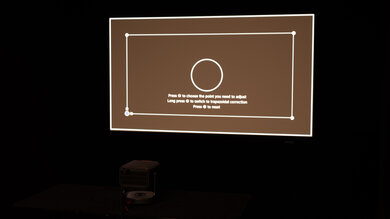
We've independently bought and tested over 60 projectors, and we've published all the detailed results for each so you can decide which one to buy. These have all been tested under the same standardized methodology, allowing you to compare them side by side. We still have all these projects in our lab so we can continually go back and compare them to ensure our reviews are still accurate. All our test methodology is also public on our website, so you can validate the results yourself.
Throw Calculator
Global Controls
Test Results

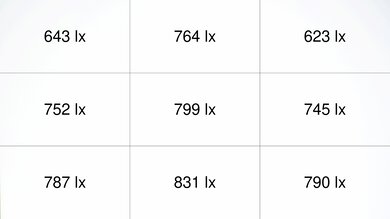
The Epson Home Cinema 1080's peak brightness is excellent. Like other projectors, it looks best when you dim the lights, but it's nevertheless bright enough for a moderately lit room.
The table below shows the additional headroom you gain by switching to brighter, yet less accurate, modes like 'Cinema Bright' or 'Dynamic,' which are better suited for daytime viewing or very bright rooms.
| Picture Mode | White Light Output (WLO) | Color Light Output (CLO) |
|---|---|---|
| Cinema | 2,204 lm | 2,213 lm |
| Cinema Bright | 2,203 lm | 2,215 lm |
| Dynamic | 3,080 lm | 3,089 lm |
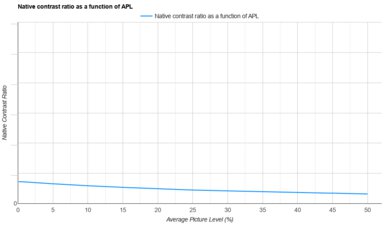
The Epson Home Cinema 1080 has weak native contrast overall. Like nearly all projectors, its contrast is highest in very dark scenes and drops as scenes get brighter, but even in those dark scenes, it's well behind most projectors, so blacks look noticeably gray, and shadowy scenes lack depth. In brighter and mixed content, it still doesn't have strong contrast, though it holds up better relative to other projectors than it does in very dark scenes.
This projector includes an Auto IRIS feature that can significantly improve Full-On/Full-Off (FOFO) contrast, but we measured the review results with it disabled, since enabling it can cause visible color shifting and throw off the color balance, especially with small elements.
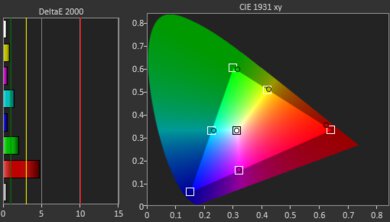
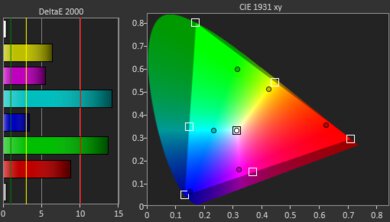
The Epson Home Cinema 1080 does a very good job with the Rec. 709 color space used with SDR content. It struggles with the wider Rec. 2020 color space used in HDR, but the unit doesn't have HDR support anyway.
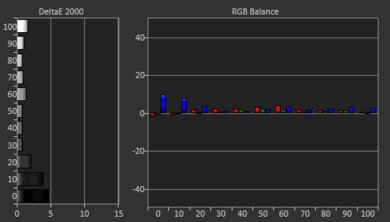
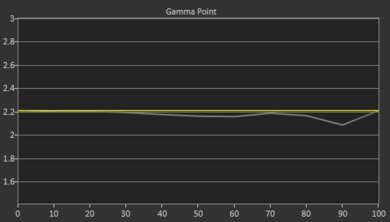

The Epson Home Cinema 1080 has great pre-calibration accuracy. However, there are minor accuracy errors in its white balance and colors, as blues are overrepresented in near blacks, and saturated reds lean slightly orange. The unit's gamma is very close to the 2.2 target for moderately lit rooms, but brighter scenes are a tad too bright. Still, most people won't notice these issues, and the projector's color temperature is very close to target, even if it does lean cold.
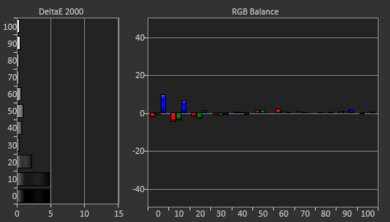
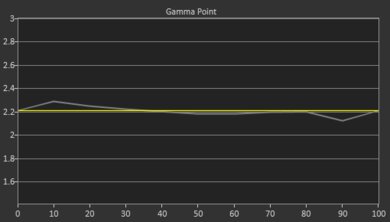

This projector has limited two-point white balance calibration and no color calibration, so you can barely improve on its pre-calibration accuracy. It is, however, possible to slightly improve the unit's color accuracy and gamma, but at the cost of a slightly colder color temperature.
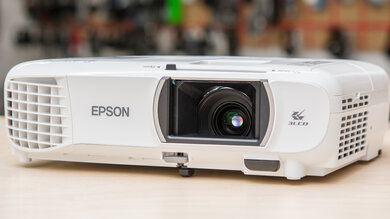
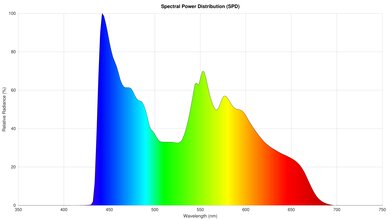
This LCD projector uses a lamp as its light source, which can last from 6000 to about 12000 hours, according to the manufacturer. After that, you'll need to swap the lamp for a new one. As it's a 1080p projector, it's limited to outputting 1080p @ 60Hz resolution and doesn't have HDR support. Its 1.2x optical zoom lets you adjust the projection size without physically moving the unit.
The Epson Home Cinema 1080 has a manual optical zoom, manual focus, and auto vertical keystone (manual horizontal). Here are some typical throw distances:
- 70" image: 5.2–6.3 ft from the screen
- 80": 5.9–7.1 ft
- 90": 6.7–8.0 ft
- 100": 7.4–8.9 ft
- 110": 8.1–9.8 ft
- 120": 8.9–10.7 ft
- 130": 9.6–11.6 ft
- 150": 11.1–13.4 ft
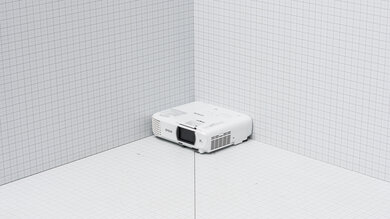
This projector isn't meant to be portable, as you need to plug it in because it lacks an integrated battery. Still, it's only 5.9 pounds and has automatic vertical keystone correction, so it's quite easy to carry around. It doesn't have an adjustable stand, but you can change its projection angle slightly with its adjustable foot. It has one 2W monoaural speaker.
At full brightness, the fan is clearly audible at close range and will intrude in quiet scenes; if you don't want to be bothered by it, raise your volume or sit away from the projector.
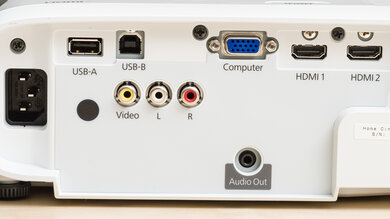
The projector has a USB-A port to which you can connect USB devices such as a flash drive or a streaming dongle. The USB-B port is meant to let a computer control the projector. The unit has Wi-Fi 5 built-in.
The projector's latency is quite high, too much so for almost every game except for turn-based titles. While the projector has a Game Mode, there's no difference in latency between that mode and the 'Cinema' Picture Mode.
This projector doesn't have HDMI ARC/eARC or digital audio output. Treat it as a video-only display: connect your sources to a soundbar/AVR first, then send video up to the projector. The built-in analog audio out can handle simple setups but won't pass multichannel formats.

